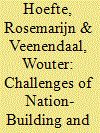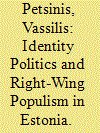| Srl | Item |
| 1 |
ID:
168838


|
|
|
|
|
| Summary/Abstract |
Instead of the term “xenophobia,” the dislike of immigrants, the term “Afrophobia” is increasingly being used to describe black South Africans’ hatred of the African other. This study analyzed nine rounds of the South African Social Attitudes Survey (2008–2016) in order to assess the evidence for Afrophobia among black South Africans. The evidence of Afrophobia among black South Africans is unconvincing. Black South Africans evinced different attitudes toward different groups of foreigners. Instead of simplistic explanations for anti-immigrant sentiment, there is a need for a more detailed and nuanced analysis of why some immigrant groups are more disliked than others.
|
|
|
|
|
|
|
|
|
|
|
|
|
|
|
|
| 2 |
ID:
168841


|
|
|
| 3 |
ID:
168837


|
|
|
|
|
| Summary/Abstract |
This analysis of nation-building and nation branding in post-colonial, multi-ethnic Suriname builds on the notion that such policies are promising but also difficult to achieve in culturally divided societies. We zoom in on three episodes of nation-building and nation branding in the country and explain why and in what respects they succeeded or failed. We posit that in Suriname’s case, nation-building and nation branding are intertwined, because the latter cannot be seen in isolation from nation-building. In the Conclusion, we discuss the effects of colonial legacies in multi-ethnic societies on nation-building and nation branding.
|
|
|
|
|
|
|
|
|
|
|
|
|
|
|
|
| 4 |
ID:
168836


|
|
|
|
|
| Summary/Abstract |
This article assesses the effects of candidate gender, incumbency, and local ethnic composition on the electoral performance of ethnic party candidates in mayoral elections in Romania and Slovakia. The results of my statistical analysis indicate that candidate gender has a minimal effect on electoral performance, whereas incumbency and local ethnic composition have a large and statistically significant effect. My findings also suggest that more experienced incumbents do not outperform less experienced incumbents, male and female incumbents enjoy a similar incumbency advantage, and ethnic party incumbents are able to attract voters from outside their target ethnic constituency.
|
|
|
|
|
|
|
|
|
|
|
|
|
|
|
|
| 5 |
ID:
168839


|
|
|
|
|
| Summary/Abstract |
This case study focuses on Estonia and introduces the populist and radical right-wing party of EKRE (Eesti Konservatiivne Rahvaerakond/Estonian Conservative People’s Party). It demonstrates that EKRE’s employment of identity politics over the refugee question and immigration is embedded inside the pre-existing frame of Estonian restoration and “decolonization” nationalism. The party’s campaign over the refugee question and immigration interlinks the collective memories of “colonization” under the Soviets with the collective anxieties of becoming “colonized” again by others in the future. This sociopsychological strategy has facilitated EKRE in augmenting its public appeal and consolidating its status as a potent actor in Estonian politics.
|
|
|
|
|
|
|
|
|
|
|
|
|
|
|
|
| 6 |
ID:
168835


|
|
|
|
|
| Summary/Abstract |
Does the ethnic identity of a country’s leader have an effect on citizens’ national identity? This question is particularly relevant in ethnically diverse states in Africa where national identity is commonly regarded as underdeveloped and ethnic divisions are socially salient. I argue that citizens’ national attachment is affected by the ethnic origin of their countries’ presidents. Using cross-country data from the Afrobarometer on levels of national attachment over time, combined with data on leaders’ ethnicities, I show that following a presidential transition national identification among the new presidents’ coethnics increases relative to that of non-coethnics.
|
|
|
|
|
|
|
|
|
|
|
|
|
|
|
|
| 7 |
ID:
168840


|
|
|